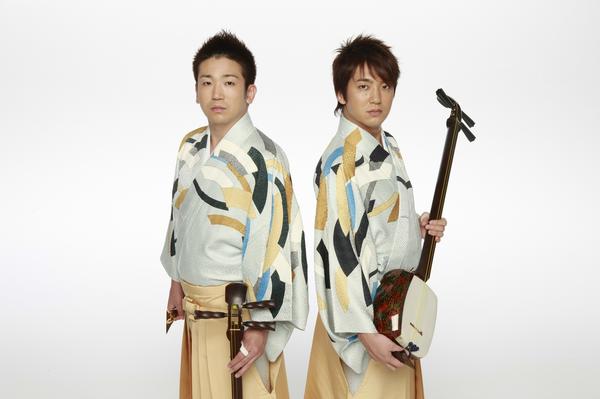The Yoshida Brothers, the stellar tsugaru-shamisen duo comprised of siblings Ryoichiro and Kenichi were a pop culture phenomenon in their native Japan in the first decade of the 21st century. They achieved rock star status with their compelling and revolutionary East-meets-West interpretation of the traditional Japanese instrumental musical form.
Yoshida Brothers coaxed powerfully vivid sounds out of their simple three-stringed instruments, playing with muscular, Jimi Hendrix-like passion, and reinvigorated Tsugaru-shamisen for a new generation. They wore formal ceremonial garb of kimonos and hakama pants onstage, but the brothers, who were in their mid 20s at the time, also appeared with their stylish dyed, light brown hair that was the rage among Japan’s forward thinking youth, further endearing them to a growing legion of fans.
The Yoshida Brothers started practicing the art of tsugaru-shamisen since age 5 when, in their northern Hokkaido home, their father first fashioned them crude instruments made from wooden bowls. They went on to study with local master Takashi Sasaki and soon were winning first place rankings in the Junior and High School divisions of the National Tsugaru-Shamisen Competitions, and from there, top solo awards in the general division.
Their first album, 1999’s Ibuki, sold more than 100,000 copies, an astounding statistic, considering that historically, shamisen albums sell in the 5,000 units range at best. “After we made our CD debut,” said Ryoichiro, “a wide range of people started listening to Tsugaru-shamisen, especially younger generations. We have been trying to preserve the traditional, yet make it fun.” Of their blockbuster success, Kenichi noted, “This is a good thing?and to be honest, we are the ones who have been surprised the most!“
After that, the Yoshida Brothers released more hit albums in Japan: 2000’s Move, 2002’s Soulful, and 2003’s Frontier, with total sales approaching 300,000. Over the extraordinary course of their ascendant career, they incorporated textures and sounds from various and sundry global music idioms into their unique artistry, including Peruvian folk, Spanish flamenco, Chinese flute, and rock, all within the context of innovative yet authentic Tsugaru-shamisen.
Their 2003 U.S. debut album on Domo Records, Yoshida Brothers, introduced these masterful and charismatic young artists, and their mesmerizing East-meets-West, age-old yet completely modern, technically stellar yet equally passionate music to a New World of fans. The Yoshida Brothers had never performed, and rarely been heard, outside of Japan, and at this remarkable turning point, Kenichi said, “I believe Tsugaru-samisen’s sounds touch people’s hearts, and I am happy if listeners around the world feel it even only slightly.” Ryoichiro summed up their forthcoming journey with “My dream, Tsugaru-shamisen to the world, comes true, and I am so excited!“
III, the Yoshida Brothers’ third album to be released in the United States, took the Brothers’ pioneering East-meets-West fusion of Tsugaru-shamisen and jazz, rock, pop, folk, blues, world idioms to new heights under the guidance of celebrated, veteran rock-pop producer and musician Tony Berg. Berg’s extensive production credits include Nickel Creek, Michael Penn, Lisa Loeb, Squeeze, Van Morrison, The Replacements, Charlie Sexton, Nancy Griffith, Pete Yom and many more top artists.
“When I first saw the Yoshida Brothers play a show in Santa Monica,” recalls Berg, “I was blown away, knocked out. Not just by their virtuosity, but by their wholehearted commitment to the world that their music seems to evoke. It was very inspiring.” While most of Berg’s work has been in the rock/pop field, he has long had an affinity for music from all corners of the globe, and has played on and produced various projects in affiliation with Peter Gabriel’s internationally diverse Real World label. His deep background and vast musical knowledge uniquely positioned Berg to have the vision to orchestrate the rich pan-cultural tapestry of the Yoshidas’ artistry.
Following an extensive 2005 pre-production phase fleshing out pieces that Ryoichiro and Kenichi had brought to the U.S. to record. Berg began introducing some less traditionally Japanese selections into Ill’s repertoire. Among such stand-outs is the Yoshida Brothers’ revelatory version of the Brian Eno song “Sy This River.” “Besides being a sublime and exquisite piece whose pentatonic rhythm lends itself beautifully to shamisen,” says Berg, “it has a brilliant lyric.” The only song on the album to feature vocals, the track spotlights former Remy Zero lead singer Cinjin Tate, whose brother Shelby sits in on keyboards.
Tapping into an equally stellar composition from further afield, the Yoshida Brothers’ also interpreted composer Peter Lionder’s “Erghen Diado,” popularized internationally by the Bulgarian State Radio & Television Female Vocal Choir on their 1990 album Le Mystere des Voix Bulgares. Grammy-winning musicologist/producer Marcel Collier, best known for his work with Zamfir, arranged the track, architecting a soundscape with strings, bass and drums. “It’s a difficult piece to play,” says Berg, adding, “I felt that out Led Zeppelin-like treatment would really complement the Yoshida Brothers’ take on it.”
Another cover was the Brothers’ spare and elegant version of John Lennon and Yoko Ono’s “Oh My Love,” a track that is as ethereal as “Erghen Diado” is muscular. Ryoichiro said that Berg picked the composition-an essential East-meets-West fusion of its own-because, “he thought the Japanese-like melody would work well with the Shamisen.” Berg agreed, calling the song, “most beautiful.”
Other highlighted tracks included the high-energy “Hit Song,” co-written by rock producer Mitchell Froom, who also played keyboards on the cut, which had the Yoshidas’ signature shamisens leading a full string section.
“Passion,” included Brazilian guitar master Oscar Castro Neves. Tony Berg plays steel string guitar and percussion on the rapturously cinematic track, and the producer also lends his multi-instrumental talents on several other of III‘s songs.
The Yoshida Brothers have not released any new internationally-distributed albums since 2009.
Discography:
Ibuki (1999)
Move (2000)
Soulful (2002)
Frontier (2003)
Yoshida Brothers (Domo Records 73032-2, 2004)
Yoshida Brothers, Vol. 2 (Domo Records, 2005)
III (Domo Records, 2006)
Hishou (2007)
Best Of Yoshida Brothers (2008)
Prism (2009)


